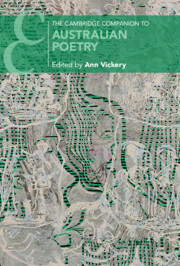Book contents
- The Cambridge Companion to Australian Poetry
- The Cambridge Companion to Australian Poetry
- Copyright page
- Contents
- Figures
- Contributors
- Acknowledgements
- Chronology
- Introduction
- Part I Change and Renewal
- Part II Networks
- Part III Authors
- Part IV Embodied Poetics
- 13 The Strength of Us as Women
- 14 “Country Snarled / in Borders”
- 15 Australian Poets in the Countries of Others
- 16 Writing the Body
- 17 Not the Poem Alone
- Part V Expanding Form
- Further Reading
- Index
- Cambridge Companions To …
- References
14 - “Country Snarled / in Borders”
Spatial Poetics in Asian Australian Poetry
from Part IV - Embodied Poetics
Published online by Cambridge University Press: 06 June 2024
- The Cambridge Companion to Australian Poetry
- The Cambridge Companion to Australian Poetry
- Copyright page
- Contents
- Figures
- Contributors
- Acknowledgements
- Chronology
- Introduction
- Part I Change and Renewal
- Part II Networks
- Part III Authors
- Part IV Embodied Poetics
- 13 The Strength of Us as Women
- 14 “Country Snarled / in Borders”
- 15 Australian Poets in the Countries of Others
- 16 Writing the Body
- 17 Not the Poem Alone
- Part V Expanding Form
- Further Reading
- Index
- Cambridge Companions To …
- References
Summary
Identifying a predominant focus in spatial poetics in Asian Australian poetries, this chapter suggests that diasporic self-mapping is often ambivalent as poets navigate shifting or liminal spaces. The chapter argues that geopolitical differences distinguish Asian Australian experiences from those of their Asian American counterparts. It examines the mediation of migration and understanding of past and present in the work of Ee Tiang Hong, and how transnational mobility informs the hybrid and spliced practice of Ouyang Yu and Merlinda Bobis. The chapter analyses an intergenerational feminist interest in borders and journeys in the work of Bobis and Eunice Andrada. It then examines how later-generation poets may face quite different challenges in navigating ancestral homeland and the search for connections, or, alternatively, find a freedom in travelling and uncertainty. The chapter also considers transcultural and translational strategies, and discusses Omar Sakr’s mapping of “unbelonging.” The chapter concludes by asserting that the rich heterogeneity of poetries cannot be reduced to a single term, even in such a disruptor term as “Asian Australian.”
- Type
- Chapter
- Information
- The Cambridge Companion to Australian Poetry , pp. 236 - 251Publisher: Cambridge University PressPrint publication year: 2024

